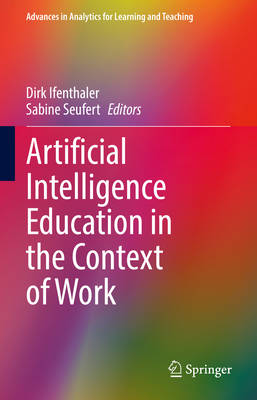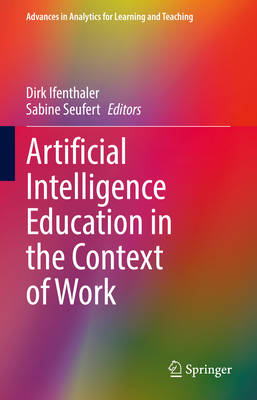
- Retrait gratuit dans votre magasin Club
- 7.000.000 titres dans notre catalogue
- Payer en toute sécurité
- Toujours un magasin près de chez vous
- Retrait gratuit dans votre magasin Club
- 7.000.0000 titres dans notre catalogue
- Payer en toute sécurité
- Toujours un magasin près de chez vous
Artificial Intelligence Education in the Context of Work
Description
Part I - Conceptual and Empirical Perspectives.- Chapter 1 - AI-supported systems for integrated skills-management and skills-development (Christoph Meier, Sabine Seufert).- Chapter 2 - Four perspectives on personalized and adaptive learning environments for workplace learning (Yvonne M. Hemmler, Dirk Ifenthaler).- Chapter 3 - Shaping AI Transformation: digital competencies and augmentation strategies of HRD professionals (Judith Spirgi, Josef Guggenmos, Sabine Seufert).- Chapter 4 - Leveraging artificial intelligence techniques for effective scaffolding of personalized learning in workplaces (Duygu Umutlu, M. Emre Gursoy).- Chapter 5 - Supporting stress detection via AI and non-invasive wearables in the context of work (Mariano Albaladejo-González, José A. Ruipérez-Valiente).- Chapter 6 - Knowledge state networks for skill assessment in atomic learning (Julian Rasch, David Middelbeck).- Chapter 7 - The engine design of electronic performance support system for employees' training based on training need analysis (Salim Atay, Muhittin Sahin, Aysu Cetinbinici, Deniz Subası, Furkan Aydın, Savas Ceylan).- Chapter 10 - AI-enhanced interfaces as informal guides (Melissa Peterson).- Part II - Practices and Case Studies.- Chapter 11 - Workplace learning in and with intelligent systems (Felix Miesen, Susanne Narciss).- Chapter 12 - Case Volkswagen Passenger Cars - Upskilling strategy for employees (Judith Spirgi, Andreas Meier).- Chapter 13 - Not plug-and-play: successful adoption of an ai-based learning experience platform (Nadia Eggmann).- Chapter 14 - Using AI-based Linkedin video platform for personalised learning: the case at Infineon Technologies (Judith Spirgi, Julia Tronsberg).
Spécifications
Parties prenantes
- Editeur:
Contenu
- Nombre de pages :
- 250
- Langue:
- Anglais
- Collection :
Caractéristiques
- EAN:
- 9783031141034
- Date de parution :
- 22-11-22
- Format:
- Livre relié
- Format numérique:
- Genaaid
- Dimensions :
- 156 mm x 234 mm
- Poids :
- 544 g

Les avis
Nous publions uniquement les avis qui respectent les conditions requises. Consultez nos conditions pour les avis.





